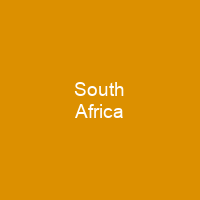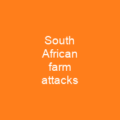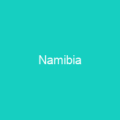South Africa

South Africa is the southernmost country in Africa. It is one of the few in Africa never to have had a coup d’état. About 80% of South Africans are of Black African ancestry. The remaining population consists of Africa’s largest communities of European, Asian, and multiracial ancestry.
About South Africa in brief
 South Africa, officially the Republic of South Africa, is the southernmost country in Africa. With over 59 million people, it is the world’s 24th-most populous nation and covers an area of 1,221,037 square kilometres. About 80% of South Africans are of Black African ancestry, divided among a variety of ethnic groups speaking different African languages. The remaining population consists of Africa’s largest communities of European, Asian, and multiracial ancestry. South Africa is a biodiversity hotspot, with a diversity of unique biomes and plant and animal life. The country is one of the few in Africa never to have had a coup d’état, and regular elections have been held for almost a century. It has been classified by the World Bank as a newly industrialised country, with the second-largest economy in Africa, and the 33rd-largest in the world. The name \”South Africa\” is derived from the country’s geographic location at the southern tip of Africa. The two most spoken first languages are Zulu and Xhosa. The two next ones are of European origin: Afrikaans developed from Dutch and serves as the first language of most coloured and white South Africans. English reflects the legacy of British colonialism, and is commonly used in public and commercial life. About a quarter of the population is unemployed and living on less than US$1.25 a day. The most UNESCO World Heritage Sites in Africa include Sterkfontein, one of world’s richest sites for hominin fossils, and Swartkontein in the Swahili language.
South Africa, officially the Republic of South Africa, is the southernmost country in Africa. With over 59 million people, it is the world’s 24th-most populous nation and covers an area of 1,221,037 square kilometres. About 80% of South Africans are of Black African ancestry, divided among a variety of ethnic groups speaking different African languages. The remaining population consists of Africa’s largest communities of European, Asian, and multiracial ancestry. South Africa is a biodiversity hotspot, with a diversity of unique biomes and plant and animal life. The country is one of the few in Africa never to have had a coup d’état, and regular elections have been held for almost a century. It has been classified by the World Bank as a newly industrialised country, with the second-largest economy in Africa, and the 33rd-largest in the world. The name \”South Africa\” is derived from the country’s geographic location at the southern tip of Africa. The two most spoken first languages are Zulu and Xhosa. The two next ones are of European origin: Afrikaans developed from Dutch and serves as the first language of most coloured and white South Africans. English reflects the legacy of British colonialism, and is commonly used in public and commercial life. About a quarter of the population is unemployed and living on less than US$1.25 a day. The most UNESCO World Heritage Sites in Africa include Sterkfontein, one of world’s richest sites for hominin fossils, and Swartkontein in the Swahili language.
The South African National Party imposed apartheid in 1948, institutionalising previous racial segregation. After a long and sometimes violent struggle by the African National Congress and other anti-apartheid activists both inside and outside the country, the repeal of discriminatory laws began in the mid-1980s. Since 1994, all ethnic and linguistic groups have held political representation in the country’s liberal democracy, which comprises a parliamentary republic and nine provinces. It is a middle power in international affairs; it maintains significant regional influence and is a member of both the Commonwealth of Nations and G20. Some political parties prefer the term “Azania” for South Africa, while some Pan-Africanist parties prefer “South Africa” South Africa has an official name for some of the oldest archaeological and human-fossil sites: Mzansi. Since 1961, the long formal name in English has been the Republiek van Zuid-Afrika and Republiki van Suid- Afrika in Afrika. Since 1994 the country has had an official names in each of its 11 official languages: MZansi, from umzantsi, meaning “south” or “south Africa” Mzinsi is a colloquial word for “south”, while Pan- Africanists prefer the political term “azania” South. Africa ranks 113th on the Human Development Index, the seventh-highest in African.
You want to know more about South Africa?
This page is based on the article South Africa published in Wikipedia (as of Dec. 23, 2020) and was automatically summarized using artificial intelligence.












